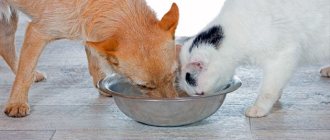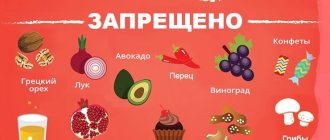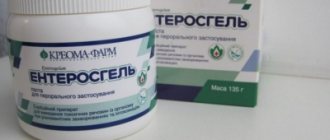Loving owners try to treat their beloved pet with a tasty treat. You should always remember which treats can be given to dogs and which cannot. Many owners try to find out whether dogs can eat tangerines and in what form. You need to be very careful with this product.
Tangerines are a tasty treat that should be given to your dog with caution.
The benefits and harms of citrus fruits in a dog’s diet
Every dog breeder knows why dogs should not eat citrus fruits. Even though these products are not poisonous, they cause severe allergies in animals. In addition, oranges, tangerines and lemons have a strong odor that dogs cannot tolerate.
Citric acid often causes irritation of the digestive tract and even depression of the central nervous system. Other scientists and veterinarians note that it is not so much citric acid that has a negative effect on animals, but sucrose.
However, all experts agree that 1-2 small slices of citrus fruit per day will not harm your dog. It is important not to exceed this dose.
Citrus fruits have many beneficial properties:
- A source of vitamin C - the largest amount is found in oranges, and tangerines contain slightly less.
- Strengthens the immune system, especially during heavy physical activity.
- Contains vitamins A, B1, B2, B6, B9, D, E, K and PP.
- Rich in minerals - sodium, calcium, magnesium, potassium and phosphorus.
- They will become sources of dietary fiber, ash, proteins, fatty acids, thiamine, folates.
The smell of citrus fruits repels dogs, but a couple of tangerine slices will be a great treat.
These fruits often cause allergies in both humans and dogs. Citrus fruits are especially harmful for diseases of the kidneys, liver, pancreas, as well as for diabetes, hormonal disorders and thyroid diseases.
Oranges do not cause as much harm to a dog's health as avocados, grapes and apricots. However, you need to be very careful with citrus fruits and not overfeed your dog with them.
Some citrus fruits, such as oranges, will be especially useful during the period of vitamin deficiency - in spring and autumn. This will help improve the dog’s health and make his immune system strong and strong. During the winter months, these fruits will protect your pet’s health and help resist diseases. Citrus fruits have a beneficial effect on the heart, blood vessels, brain and muscles of the animal. They are rich in antioxidants, improve blood circulation and cleanse the body of toxins.
Interesting fact! Not only the slices themselves are useful for dogs, but also the white fibrous pulp between the slices and the zest.
Oranges are contraindicated for puppies
Is it possible to give tangerines, oranges, lemons to a pet?
If your pet asks for a piece of tangerine, you can treat it. But this treat should be given little by little and no more than once a day.
There is no need to be afraid of an overdose of vitamin C: it easily dissolves in water and is excreted from the body.
Many dog breeders are confident that dogs should not eat foods that their wild relatives, such as wolves, do not eat. Over the millennia that the dog has lived next to humans, it has grown to love many foods from the human diet. Therefore, you can treat a healthy dog with a small slice of tangerine.
In the wild, dogs often eat wheatgrass to cleanse their stomachs, although the grass is inedible to them. Therefore, there is no need to worry if your dog suddenly begins to show increased interest in oranges.
The danger of exotic fruits is that many fruits are treated with harmful chemicals. Fungicides, sulfur dioxide, biphenyl and bromine are especially dangerous. These substances can cause severe poisoning even in humans. It is necessary to choose fruits very carefully, pay attention to their quality and wash them with soap before eating.
When trying to find out whether dogs can eat oranges, the owner must find out if the pet has allergies. If the dog is healthy, you can give him a couple of orange or tangerine slices. If your dog is allergic, it is better to treat him with an apple.
Orange and tangerine peels are not suitable for dogs to eat; on the contrary, they repel animals with their smell.
Important! Fruits for animals should not be sprinkled with sugar.
Fruits are rich in vitamin C, they must first be peeled
Dogs often show no interest in fruit.
We ourselves want to give them an extra portion or pamper them. This is where internal disagreements arise. On the one hand, tailed companions are omnivores. If they calmly eat cereals and vegetables, then why not offer an apple? On the other hand, fruits are sweet, but sweets are not allowed for pets. What position should I take?
The only correct answer: avoid extremes! First, remember the quality of the products. If we are talking about perfect early watermelons, then it is absolutely forbidden to give them. Many fruits and berries are treated with chemicals to protect them from insects and preserve their presentation. Secondly, there is a list of prohibited treats that are really dangerous for the children under their care. Thirdly, everything is good in moderation. The same watermelons can harm the kidneys and heart if consumed in large quantities.
The following question arises: “Is it worth diluting the menu with fruits? After all, you can try to do without them, since complementary feeding raises so many doubts.” In any case, the choice is yours. If you are categorical, create a menu without fruit. However, keep in mind that they perfectly clean teeth, preventing the formation of stone. The products contain many useful substances that improve digestion.
All of the above applies only to absolutely healthy animals. If your pet has any chronic diseases, the diet should be discussed with your veterinarian.
Citrus fruits for pregnant women and puppies
During pregnancy and lactation, citrus fruits should not be given to dogs, as the risk of allergies is too high. For the same reason, tangerines are prohibited for puppies. An allergy to citrus fruits is insidious in that it can accumulate in the body. A dog can eat such treats for a long time without health problems, but with the slightest weakening of the immune system, allergies can suddenly appear.
Pregnant and lactating dogs, as well as puppies under 1 year of age, are too weak and vulnerable. They must be protected from any harmful substances and allergens. During this period, it is better to treat your pets with an apple.
Puppies under 7–8 months should not be offered citrus fruits. When the baby grows up, you can treat him to 1 small slice. If he doesn’t like it, you shouldn’t give this product in the future. If the puppy is satisfied, then next time this treat can be given no earlier than after 4-5 days. You should not treat your pet with tangerines too often.
Attention! Many puppies and young dogs have difficulty swallowing fruit. If your pet chokes, he may suffocate. Therefore, you should give your puppy tangerines and other fruits only under supervision.
Recommended fruits
Berries and fruits contain substances necessary for the life of animals: vitamins, acids, carotene, pectin, fiber, mineral salts of iron, potassium, magnesium. Therefore, their benefits for the dog’s health are undeniable.
Apples
Available, completely safe and help improve digestion. Apples are a source of vitamins A, B, C, potassium, calcium, magnesium, iron. Their low protein and fat content makes them a healthy snack for older dogs. It is better to choose unsweetened green fruits. A large dog can be given a whole apple, a small dog one or two pieces.
Pears
Pears contain vitamins C, K, copper, fiber, and strengthen blood vessels. Sourish fruits with crispy flesh are suitable for dogs.
Bananas
It is an essential source of potassium, as well as copper, fiber, and biotin. Ripe fruits have a lot of sugar, so the amount is limited. For a large dog, 1-3 pieces per week are enough; for a small dog, one fruit, cut into pieces, will be enough. Unripe bananas can cause digestive upset.
Citrus fruits for older dogs
Another vulnerable category of pets are older dogs. In old age, animals often develop stomach problems. Tangerines and other citrus fruits irritate the walls of the stomach and cause digestive problems. Therefore, it is advisable to refuse such treats and not give tangerines to an old dog.
To ensure that an elderly dog receives enough nutrients, it is best to include a canine vitamin and mineral complex in his diet, rather than natural fruits.
Toy breeds should not eat citrus fruits
Content
1. What are the benefits of citrus fruits? 2. Are tangerines harmful to dogs? 3. How much can you give 4. In what form should you give?
Many people associate winter and New Year with the smell of tangerines, and these healthy citrus fruits can be found on the table in every home at this time of year. And it’s not surprising that the pet sits next to us and looks pleadingly into our faces when we eat fruit, stocking up on vitamins. The hand just reaches out to treat its four-legged friend, without even thinking - is it possible to give tangerines to a dog?
In what form and how often should you give treats?
Citrus fruits can be given no more than once a day, preferably not every day. From the time the pet ate the slice, at least 2–4 days should pass.
- Tangerine and orange slices should be given only fresh, not sweetened. Under no circumstances should you add white sugar.
- The slices must be peeled and added to the porridge along with the apple pieces. Giving treats separately is not recommended.
- Occasionally it is allowed to place a slice in water to make natural fresh lemonade.
- You can squeeze the juice out of the fruit, dilute it with water and offer your dog a drink.
- Concentrated juice should not be given.
All treats should make up only 10% of the daily diet. The share of tangerines among fruit delicacies should not exceed 1%. A pet that is overfed with fruits and other treats can become overweight, which can cause many health problems.
After your dog eats a tangerine slice, you need to carefully monitor his well-being over the next few days. If allergies or other health problems occur, these fruits should no longer be given.
It is advisable to give tangerine pieces mixed with apple pieces
Tap water or bottled
In hot weather, every pet should have unlimited access to water. The main thing is that it is clean, at moderate room temperature. Cold water can cause an undesirable reaction in the gastrointestinal tract, especially if the animal is older or suffers from cholecystitis or pancreatitis.
The best thing is filtered water without chlorine, spring water. Non-mineral, bottled will work well. The main thing is that there is no gas in it. It is not advisable to pour water from the tap; in extreme cases, you can boil it and cool it.
To whom are they contraindicated?
You should always remember the potential dangers of citrus fruits. But there are animals for which these products are strictly contraindicated:
- sick dogs (with any diseases);
- allergy sufferers;
- pregnant women;
- nursing;
- puppies up to 12 months.
Belonging to a particular breed often influences your susceptibility to food allergies. Many owners are interested in whether a Yorkie or a Pomeranian/Chihuahua can have tangerines. No you can not! Miniature decorative dogs suffer from allergies more often than others. Therefore, you should never offer them citrus fruits, even if the pet strongly asks for it.
Shar Peis, Labradors and Bulldogs also have sensitive digestion. Oranges are also contraindicated for them. These fruits can harm animals with any hormonal disorders.
Attention! It is strictly forbidden to give peels and seeds to dogs. These parts of the fruit are not digestible and can cause intestinal obstruction.
Citrus fruits are harmful to pregnant and lactating dogs
What's not allowed?
The following foods should never be given to your pet:
- chocolate;
- grapes or raisins;
- avocado;
- sugar;
- cookies, candies and other sweets;
- baked goods;
- smoked meats;
- pickles;
- sausages;
- pork;
- mayonnaise and products with it, for example, salads;
- spices;
- spicy dishes;
- ketchup;
- carbonated drinks;
- alcohol.
CAREFULLY!
You should not give your dog tubular bones, as well as chicken feet or any boiled bones in general, as this can lead to perforation of the esophagus or intestines.
Healthy berries
Berries are another acceptable and healthy treat. However, among them there are also varieties that pose a danger.
Sweet cherry pits contain cyanide and can become stuck in the throat if swallowed.
What berries can be included in your diet in moderation:
- One of the first summer berries is strawberries. Serves as a source of fiber and vitamin C.
- Blueberries are useful for antioxidants, vitamins A, E, K. This berry is often included in high-end industrial specialized feeds.
- Raspberries have anti-inflammatory properties. May be useful for older animals. It is also rich in vitamin C.
- Rowan has no contraindications and is a good source of microelements. Contains essential organic acids and pectin. There is more provitamin A in its ripe berries than in some vegetables, for example, carrots. It is advisable to get used to this berry from a young age.
Do they eat?
Citrus fruits are a source of vitamins. Many dogs refuse an offered piece of meat in order to eat a piece of tasty fruit. Experts recommend reviewing the animal’s diet; it is possible that the pet’s body lacks vitamins and micro-macroelements.
You shouldn't overuse tangerines, even if your dog loves them very much. Fruits contain lemon juice, which negatively affects the digestive system. A dog can easily do without them; tangerines only give satisfaction from eating them.
First aid
Treatment for poisoning by tangerines, lemons, and oranges in dogs is based on symptoms. First of all, it is necessary to remove substances that provoke poisoning from the dog’s body. For this purpose, sorbents such as Enterosgel and Polysorb are used.
Useful! They should be in every veterinary medicine cabinet. If consumption of citrus fruits results in an allergy, antihistamines should be used. Suprastin and Zyrtec are suitable for dogs.
In the worst situations, a pet may experience Quincke's edema. In this case, you cannot do without a veterinarian. At the clinic, a specialist must intramuscularly inject the dog with Prednisolone and concentrated Suprastin. Further treatment should be symptomatic. Its purpose is to remove remaining toxins from the dog’s body. This usually happens with the help of diuretics.
In the future, you will have to stop using tangerines, lemons, limes, and oranges in your dog’s menu. They need to be replaced with special preparations adapted to the individual characteristics of the dog. For example, a substitute called Ester-S is actively used by dog handlers around the world. This product allows you to replenish your supply of vitamins in a short time.
Could you be allergic to them?
Food allergies to fruits in dogs are common. It is difficult to guess what it will manifest itself into; you will have to act by trial and error. If the animal begins to itch, rashes appear on the skin, the nose, eyes, and tips of the paws turn red - this is an allergy. Need to:
- Give an antihistamine.
- Reduce feeding to neutral, already proven feeding.
- Show it to a veterinarian to clarify the diagnosis.
An allergic reaction can be persistent, lasting 2-3 days. All this time the dog needs a diet.
Got sick
If a dog does not know the limits in eating fruit, then its body may react as follows:
- diarrhea;
- vomit;
- depressed state.
Vitamin C that enters the animal’s body is excreted in the urine very quickly; it does not accumulate. First you need to stop vomiting, and then start fighting diarrhea. The dog will quickly return to normal, just from now on keep citrus fruits away from it.
Fruits that are unsafe
Citrus
In most cases, feeding a dog citrus fruits causes unpleasant consequences (causing vomiting and a laxative effect), but there have still been cases where some dogs happily ate them without any consequences. Therefore, the dog itself will let you know whether it wants to eat citruses or not.
Grape
Kidney failure in dogs can occur after eating grapes. Grapes often cause attacks of vomiting, weakness and diarrhea in dogs.
Pomegranate
Symptoms of poisoning from tangerines, lemons or oranges in dogs
Some dogs are prone to overeating. You need to control how many slices your four-legged friend eats per day. To do this, you need to think through your pet’s menu every day. And store fruits so that the animal does not have easy access to them, for example, in a special container in the refrigerator. Otherwise, negative reactions may occur caused by an overdose of citrus fruits.
Important! Gastrointestinal upset is the most common reaction of the canine body to an excess of citric acid and other elements of citrus fruits.
The first sign is a change in the concentration of stool or diarrhea. Digestive upset also manifests itself through uncontrolled vomiting.
In exceptional cases, intoxication may occur. It is expressed in the appearance of allergic spots on the skin. In the long term, the dog's hair falls out and dandruff appears. Usually the owners notice these reactions between the pads of the fingers, near the scruff of the neck, along the line of the spine.
Local swelling is also possible. It appears on the larynx, tongue and muzzle tissues. Swelling most often goes away within a few hours. Especially when providing first aid.











